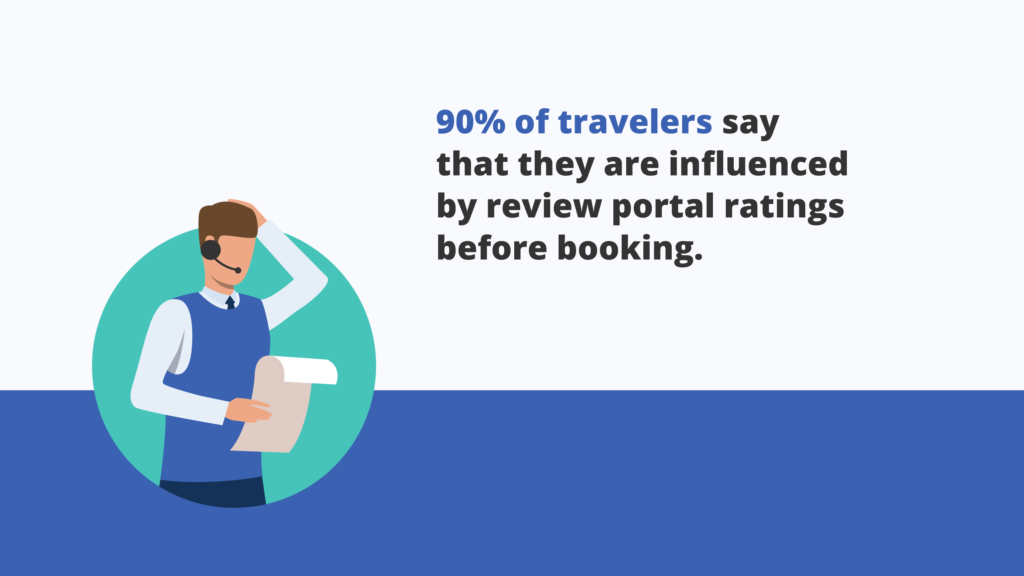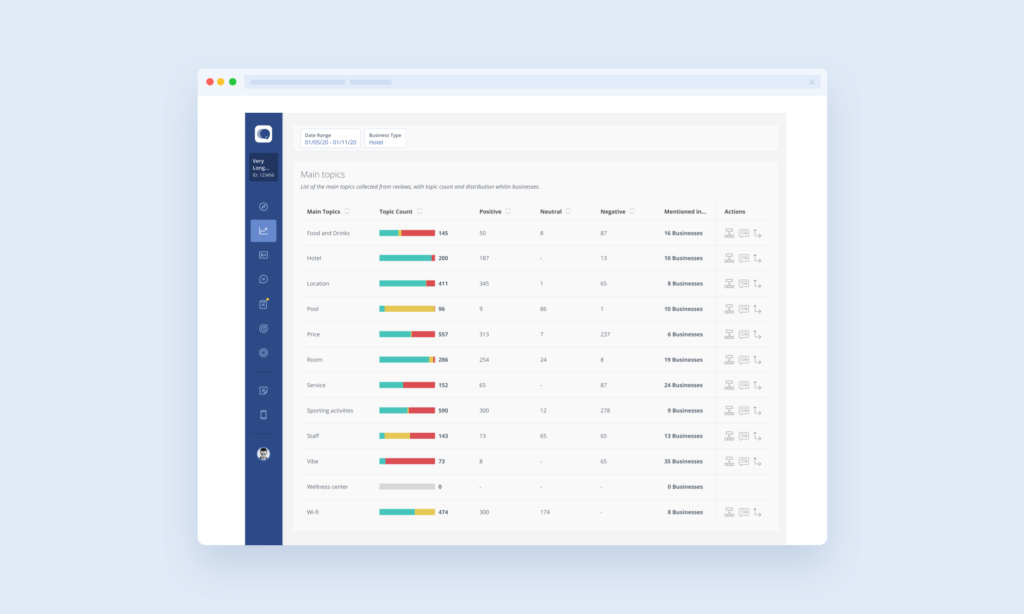We can never repeat it enough – guest reviews are of utmost importance for any service establishment. Word of mouth which was once relatively controllable, it is now easily spread via various review portals accessible on computers, tablets or smartphones. Both positive and negative reviews bring benefits for your business. Yes, you read correctly: when managed successfully, even negative reviews can support – rather than ruin – your business.
In this article we will not only highlight what effective review management can do for your brand reputation and revenue, but more importantly, how you hurt your business when you fail to take action. Because even though guest review management may seem abstract to some, it is nevertheless critical to understand the consequences in both financial and brand terms for your hotel.
Some figures to keep in mind

If the price of a room is the most important factor for a reservation, then guest reviews and recommendations are second and play an increasingly important role. 79% of consumers consider guest reviews as relevant as recommendations from relatives. In addition, 90% of travelers say that they are influenced by review portal ratings before booking.
Considering these numbers, it is evident the impact reviews have on bookings and how important collecting positive reviews across the internet is to generate more hotel bookings.
[ca-form id=”44600″ align=”right”]
But what about negative reviews?
According to an empirical study by the ITB and the University of Worms in Germany, more than 35% of Internet users would refrain from booking if they find more negative than positive reviews about a hotel online. 20% would even tell others about their findings.
It is estimated that an establishment risks losing 22% of bookings due to negative reviews. This figure climbs significantly when several negative reviews are posted across different portals and can result in up to a 70% loss of potential guests for a hotel. What this means for a hotel’s online reputation is pretty clear: If negative reviews dominate a hotel’s online presence, the number of bookings, and thereby their revenue, will decrease.
The message behind these numbers is that a bad review at the top of your TripAdvisor, Google or HolidayCheck pages can cost you numerous bookings. In peak season, a bad rating can quickly amount to several thousands of Euros lost when considering the traffic and bookings generated by these sites.
[ca-form id=”194451″ align=”left” var1=”https://www.customer-alliance.com/wp-content/uploads/2022/08/customer-alliance-article-guide-cost-negative-review-hotel-EN-download-1.pdf”]
Can negative reviews be managed for damage control?
Oh yes! A TripAdvisor study from early 2015 showed, that in Germany alone, 83% of hotel guests would book again if they received a “reasonable” response from management to their negative online review. If you keep in mind that another TripAdvisor study also revealed that a 1% rating boost increases a hotels booking potential by more than 11%, you see obvious opportunities as a direct result of managing your online reviews both for damage control and future revenue growth.
To summarise, the financial impact of a negative review can not only be felt on your booking rate, but also on the volume of reservations therefore drastically impacting your yearly turnover. As a hotelier or revenue manager, pricing a room or package has become complex as you must now consider even more factors. In addition to monitoring competitors and price fluctuations based on seasonality or events occurring in your city, you should closely monitor guest reviews which represent the value and quality perception of your hotel now more than ever.
How reviews influence your hotel’s branding – also internationally
We just analysed the impact of your online reputation on your bookings and subsequent revenue, but what about your brand?
As you probably know, guest reviews are mostly requested from the guest after their stay. And with easy access to the Internet, millions of guest reviews are readily available to everyone.
Whilst traditional word-of-mouth could certainly be damaging if not effectively managed, today’s review portals, such as TripAdvisor, display reviews in a number of languages, increasing the potential of exposing a global community to negative feedback from poor guest experiences. For example, a negative comment in Dutch placed at the top of your page just before people start planning their summer vacations will inevitably lead to dozens of lost Dutch bookings. As with everything else online, nothing ever truly disappears, and these negative reviews can have potential long-lasting consequences.
As previously mentioned, with an ever increasing availability of and faster access to information, combined with more international tourists each year, it is critical to manage your online reputation for various languages.
Customer Alliance allows you to invite your guests to leave a review in 19 different languages. This gives you an undeniable competitive advantage and ensures a consistent flow of opinions in various languages across all portals to improve your visibility. Additionally, via the distribution function, you strategically decide where to collect your reviews. For example, you can invite your German speaking guests to leave a review on HolidayCheck to ensure a positive image with these consumers.
Your benefits under a magnifying glass

This last, but not insignificant, point about the influence of reviews on your brand lies within the nature and details of the comments left by guests.
Obviously, you wouldn’t want the reputation of having the worst bedding or least friendly staff in the city. Repeated negative feedback on highly important topics of high importance to guests puts your establishment at risk for gaining a certain reputation overnight. Issues arising from guest reviews should not be taken lightly, but form the basis of improving your performance otherwise they could tarnish your reputation in the long run.
With our semantic analysis, Customer Alliance provides you the opportunity to centralise all your guest reviews and uncover which terms are most often referenced in your reviews. Guests repeatedly complaining about the breakfast affords you the opportunity to rectify the issue before the consequences are too substantial. As they say, “Prevention is better than a cure!”
In summary…
As you can see, guest reviews are central to any hotel strategy. Whether positive or negative, they must be treated with the utmost care to avoid any financial damage. One could summarise the points raised in this article by the phrase “To take care of your reviews is to take care of your guests.”
Whether it is to retain guests or attract new ones, listening to your guest reviews is critical. Obviously, a negative review does not mean the end of your business, but on the contrary, it gives you the opportunity to improve your services, or even anticipate the expectations of your guests in the future.
Management of negative reviews is no easy feat, which is why the Customer Alliance team helps hotels and restaurants adapt and better understand these issues.
Sources:
1. Key Insights from “Using Guest Reviews to Pave the Path to Greater Engagement
2. The Four Booking Behaviors Driving Travelers
3. Prêts à perdre des milliers d’Euros par avis négatif ?
4. The Impact of Social Media on Lodging Performance
5. How Guest Reviews Impact Your Hotel’s Reputation?
